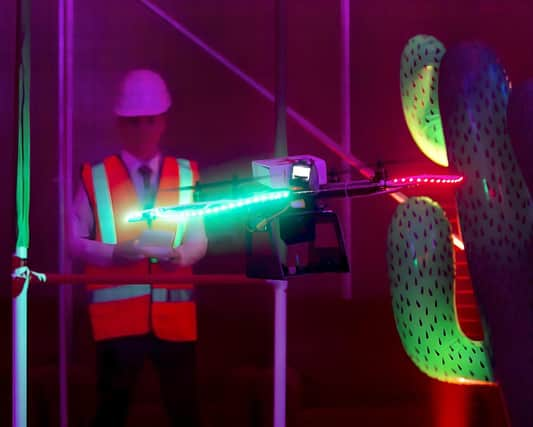Kesteven & Sleaford High School compete in Raytheon Technologies Quadcopter Challenge final


Team S.E.A, from Kesteven & Sleaford High School (KSHS) came sixth in the Raytheon Technologies Quadcopter Challenge held last Monday evening (December 12) at RAF College Cranwell.
The national competition, designed to encourage students to take up science, technology, engineering and maths (STEM) subjects, saw 92 student teams compete nationwide for the coveted title, with St Louis Grammar School from Kilkeel crowned winners.
Advertisement
Hide AdAdvertisement
Hide AdThe students were asked to consider the environment as they designed and built their quadcopters: from the materials they incorporated to the machine’s planet-saving purpose.
The KSHS team was composed of KJ Prew, Orla Durnin, Caoimhe Edwards-Stuart and LillyRose Harris.
Since April, students have been building their quadcopters, participating in practice fly days to test their designs and make real-time spot repairs, and then competing in a regional final against other local schools to claim their top stop in the final.
Hosted in a base steeped in over 100 years of Royal Air Force and aviation history, the challenge culminated in a day of competition where young people from all over the country presented their quadcopters and responded to tasks set to them by a judging panel.
Advertisement
Hide AdAdvertisement
Hide Ad“I was delighted to be on the judging panel for the national final of the Raytheon Quadcopter Challenge,” said Air Commodore Andrew Dickens, Commandant of RAF College Cranwell. “Supporting events like this that inspire future generations of scientists, mathematicians and engineers is at the heart of what the Royal Air Force Youth and STEM seek to achieve.”
The Judging panel consisted of Air Commodore Andrew Dickens, Pam Robertshaw - Head of Performance Excellence at Raytheon UK, Sajeda Afzal - Value Stream Leader at Collins Aerospace, Ross Tarnowski - Head of Learning and Skills for Engineering and Technology at Lincoln College, Maggie Appleton – chief executive of the RAF Museum and Milly Francis-Owen – an Aircraft Apprentice at Raytheon UK.
“The quadcopter challenge is actually the project which inspired me to begin a career within engineering, as I competed in the challenge aged 14,” said Millie Francis-Owen, Aircraft Apprentice at Raytheon UK.
“It furthered my interest to take engineering at GCSE, and then continue with engineering at college. This then led me to the apprenticeship which I’m currently part way through. It has had a substantial impact on my life as it has led me to where I am today.
Advertisement
Hide AdAdvertisement
Hide Ad“So much can be learnt and applied to future work I am tasked with. As a judge, I hope to inspire more students like myself,” she said.
Since it began seven years ago, the quadcopter challenge has continued to expand.
This year saw the challenge reach all four nations of the United Kingdom with over 92 teams, 41 schools and Air Cadet groups and 500 students taking part.
Raytheon Technologies Corporation is an American multinational aerospace and defense conglomerate, one of the largest in the world
